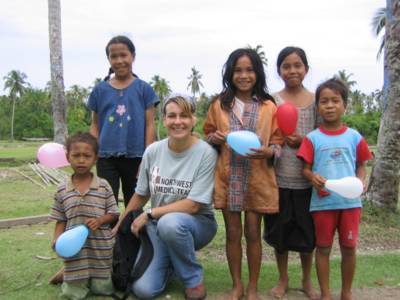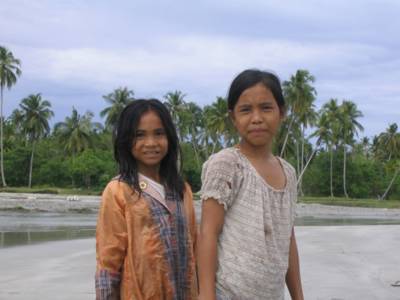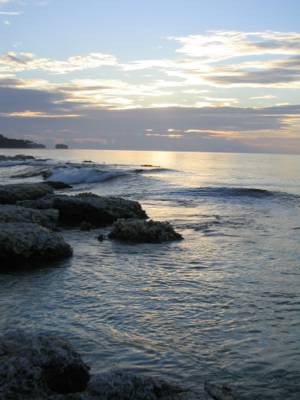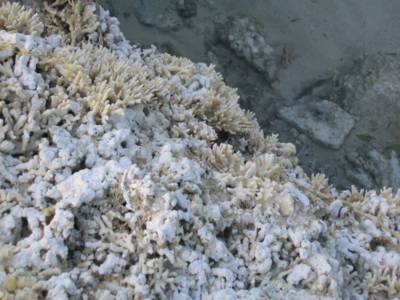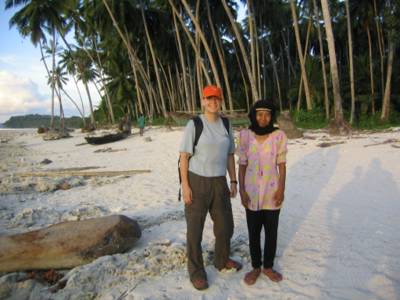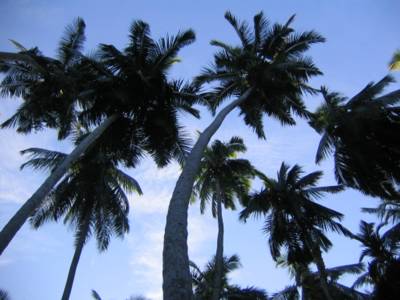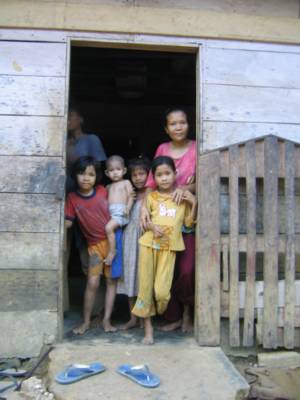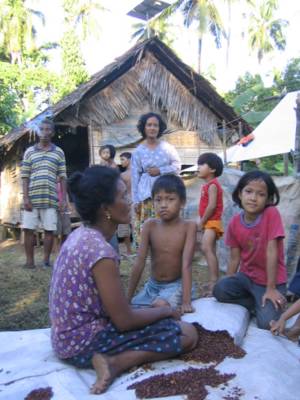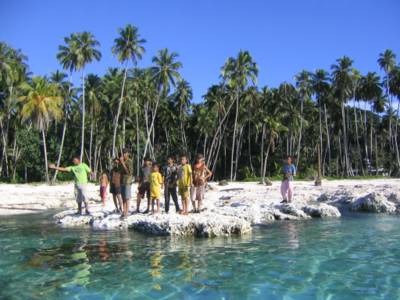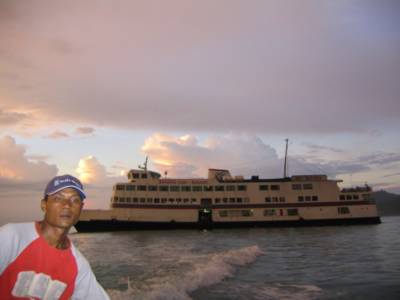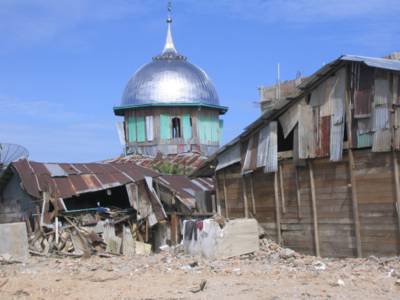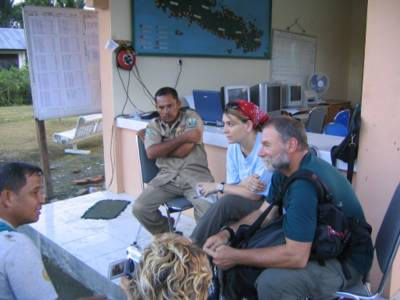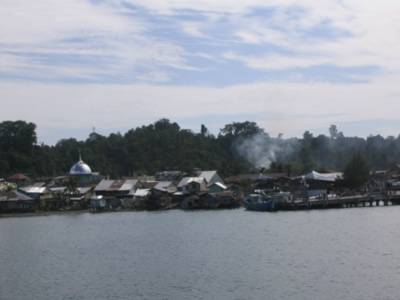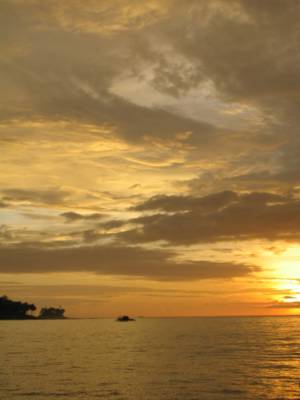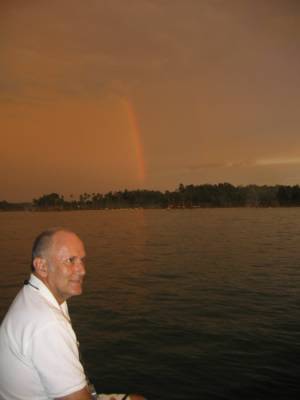mishto
Camille's blog
Tuesday, April 12, 2005
Batavia
JUST GOT BACK TO BANDA ACEH YESTERDAY - HERE'S MY JOURNALS FROM THE BOAT:
----------------------------
April 5, 2005
Sunday night we loaded up the Batavia, a 800-ton dinner-cruise ship whose mission had been transformed from feeding the Hong Kong bourgeoisie to feeding and housing and curing the Indonesian refugees. The operation is spearheaded by Captain Rick, a tough but amiable 50-something Indonesian-speaking Aussie whose trademarks are his crisp white shirts and gleaming white teeth. He was given money by Rolls Royce to opearate the ship after the tsunami, and he’s been providing aid in Sumatra for three months in cooperation with a variety of NGOs and donors. NWMT is just one part of this massively complex operation. The enormous cargo hold down below is stuffed everything we needed for our mobile assistance mission: rows of empty water jugs, pots, pans, plates, instant noodles, buckets, cooking oil, rice, baby food, boxed milk, biscuits, water bottles, tents, lumber, powersaws, wheelbarrows, workboots, shovels, pickaxes. On the loading deck we have at the ready a few motorcycles, a few motorboats, a few motorcycle taxis and lots of extra fuel.
On the passenger deck where we spend most of our time, medications are being categorized on the floor while frat boys from Indiana, Arizona and California lend their muscles to the construction of the pharmacy cabinets. We made efforts at the beginning to mingle and collaborate and strategize together with the two Indonesian medical NGOs who were also onboard (supposedly under the supervision of NWMT), but this seemed futile after the Indonesian medical staff proved to be either too shy to talk with us or too arrogant to work with us. They seem to have their own agendas for the mission, not to mention the fact that they are not about to take direction from some bulee (“whitey”). One of our translators puked for the first few hours of the voyage and we haven’t heard a word of English from him since. Add to the mix an Australian “house-mother”, who is our liaison to the cook and the cleaning staff, and a brooding young Dutch girl in tight shirts.
Living conditions aboard the boat are fine enough: not exactly clean, but not as bad as one might imagine. For dinner, we normally have a meal of rice, tofu, fish, and spinach, all covered in so much chili that I can barely eat it. At least there are no cockroaches in the food – I know they livedon the boat, along with the rats and other various unsavory characters, but the less I remind myself of their existence, the easier it is to survive. I bathe with a bucket of water in the middle of the ladies room, my lathered bare bum and its reflection in the mirror visible to all females who enter the bathroom, and – each time the door opens – to some scrawny Indonesian crew members who sleep in the hallway. Our gang sleeps on mats in the middle of the disco floor, the air conditioner blasting our icicled bits all night. We hang sheets around our individual sleeping quarters from the ceiling for privacy.
On Monday evening, the Batavia docked in the harbor outside Loh Kruet. Teams scrambled down to the loading dock to load the small motor boats that would take us to shore. The sun was falling quickly now, spreading its array of pinks and golds along the horizon, while a faint rainbow pointed toward the small settlement awaiting our arrival onshore. The boats, once boarded, speeded us toward a makeshift jetty that was now mostly swallowed up by a high tide. We stepped our Teva-ed feet through the muck and splashing saltwater to enter the flea-and-mosquito-infested beach. Tall palm trees dotted the shoreline. Nearby floated a few fishing pontoons, some of which barely survived the tsunami, some of which were newly built by the funds the Batavia provided. Light was fading fast as we approached the villagers with our crew of a dozen or so Aussies, Americans and Indonesians.
Palau Raya once had 400 residents. Eighty people died in the tsunami, and only forty remained in this settlement now. Most of the women and children still remained at the IDP camps in Lamno, 15 miles away. A few scattered tents stood on the beach of Palau Raya (Raya Island). Families (mostly sans children) huddled by the camping light under the community tent waiting… waiting for something, for someone, for an end to the nightmare, a return to their old life.
The few toddlers who remained would not greet my glance when I attempted to throw a smile their way. The boy who did, a thigh-high brown-skinned moppy-haired kid with wide expressive eyes peeking out from behind his mother’s skirt, wore a t-shirt with a picture of Osama bin Laden on the front, and George W. Bush on the back (in an Uncle Sam uniform and brandishing a rifle). I began to feel faint as the villagers’ eyes glazed over, scrupulously avoiding my own.
Rick was telling them we’ll be back, we’re not abandoning you, we have to go help the people of Simeulue for a while, we’ll build more wells and toilets and houses and fishing boats for you. But the villagers looked weary. They were tired of promises, tired of hunger, tired of nightmares of fingers losing grip of small fingers in frenetic walls of water, tired of staring out to sea wondering whether their lost relatives had ended up as fish food for the very fish they were now dependent upon for their survival. In their waking hours they could still hear themselves calling, “Grandma, hold on!” and they blamed themselves for not being strong enough or having enough arms to save everyone who floated by. They walk over the tile foundations of their neighbors’ houses and wonder what it was they had argued about that December 25th and gone to bed indignant about – the price of a goat? a rebuffed marriage proposal? a row between the children?
I saw these memories and scars on their faces as I tried not to look too intently into their tent, and the flood of tens of thousands of lives began to tug at my feet and give me vertigo. I retreated to sit on a log in the dark to steady my nausea. Breathing, breathing, breathing. I was breathing, and how many more had stopped breathing on December 26th we’ll never know. I couldn’t help remarking how peaceful and picturesque the bay looked, the calm waters lapping at the sand, the boat anchored nearby, the dark hills blanketed with chirping crickets behind. If only, if only, if only the tiny band of survivors nestled here didn’t represent the remainder of death, the x – y, with the death, with the y, with the why, hanging over every thought and every crying baby, it could have been quite a beautiful setting.
----------------------------
April 7, 2005
Spent a couple of days in Sinabang, the capital of Simeulue Island, which is pretty near the earthquake’s epicenter and much less over-run with NGOs than Nias. Sinabang is a sleepy port town, whose waterfront wooden shacks are now tilted and collapsed on their stilts, whose marketplace is now burned, and whose main mosque is topped by a recently slanted dome.
The medical team, having spent several days aboard the ship growing increasingly bored and frustratingly ghetto-ized, were eager to get ashore as soon as we docked. I had my backpack packed and ready to go: notebook, pens, sunglasses, sunblock, bug spray, visine, wallet (1 million Rupee, or $100), satellite phone, cell phone, walkie talkie, water, lip balm, book (“White Teeth” by Zadie Smith), Indonesian phrase book, kleenex, toilet paper, handy wipes, iPod, map, camera.
Rick took us immediately to meet the appropriate bureaucrats so we could get authorization to start treating patients. The road out to the government office in the hills was lined with tent cities, families living under tarps with cooking stoves and camping lanterns in the blistering heat. Some had lost their homes in the earthquake, while others were too afraid to return home for fear of the next earthquake. The head of the subdistrict, himself a temporary refugee, told us that out of the island’s population of seventy-seven thousand, seventy thousand were estimated to be living in tents.
The head of health for the subdistrict was a tightly wound, unsmiling doctor wearing the mock-military garb and cheap shoes that are the customary uniform for third world government officials. To call him unfriendly would be generous. His newly built hospital was rendered unusable by the earthquake. His staff was performing surgeries in an overheated tent in the hospital parking lot. NGOs were coming at him fast and furious making promises and then taking off, never to be seen again. Foreign doctors wanted to practice their type of medicine in his jurisdiction, undermining his authority. UN officials were demanding facts and figures from him. He and his family were living in a tent. In short, he was not in a mood to be fucked with.
He spared us a few minutes of his time, equivocating and offering vagaries as he looked impatient. Where is the greatest need? We asked. Are there areas that are inaccessible by road that we can go to by boat? We wanted to know. Can we offer any personnel or equipment to his hospital? We got nowhere with him. The conversation was made more confusing by the fact that one of the Indonesian doctors on our “team” (a Mr. Somebody in Banda Aceh who struts around the ship in his linen trousers, button-down shirts and loafers, not lifting a finger to help) was conducting separate negotiations with the hospital’s surgeon in the background. And our translator got sidetracked by his own conversation with the head doctor instead of translating for us. And a Greek woman from a Spanish NGO was trying to convince us that all the needs on Simeulue are being served and why did we bother coming? And the call to prayer was ululating from the hospital mosque, sending the nurses scurrying inside its elaborately tiled walls. And a hungry orphan tabbycat (which is of course one of my greatest weaknesses) came meowing at my ankles. And the sweat was running down my legs and inside my shirt and out from underneath my bandana down my face.
Suddenly we were all jolted by a shock of a quake – quick and violent, disorienting and heart-pounding. Everyone looked around and saw that it was over, then continued the conversation. These types of aftershocks are expected to continue for a long time, which is why the people are planning to stay in the hills for as long as they need. What the Batavia teams want to provide them with are better tents for now, more permanent housing for later, and food and health care and clean water.
It took two days in port and several meetings with local officials and international NGOs (Hey, I met you in Banda Aceh – How’s it going? How long are you here for?) to finally get letters of authorization and letters of introduction so that we could depart for the less- served rural areas. The subdistrict health officer basically chopped up the map of Simeulue, parceling out different regions for various NGOs, the Batavia being assigned the entire South-west underbelly of the island. Gulp.
On our last night in town, Rick, the Danish girl, a NWMT doctor, a translator, one of the American boys and I enjoyed a road-side meal of nasi goreng (fried rice) for a grand total of $5. We walked back to the dock in the black night, with wide crowded swaths of the Milky Way arrayed above us – stars as dense and as brilliant as those I saw camping in the Arizona and Nevada desert. Indonesians whose houses were in various stages of falling down were camped under blue tarpaulins on their porches, waiting for the next big one. I pointed my eyes to the sky while my feet stepped over buckled sidewalks.
I felt the ground move beneath me very faintly (Was it my imagination? I was unable to tell anymore), the horizon tipping in my peripheral vision, disorienting me and causing me to remember that the earth was always moving, even when I can’t feel it. Moving and spinning and orbiting and shifting and thrusting and groaning and boiling and traveling through time and space. We puny humans are never going to be more powerful than that.
The earthquake and tsunami, which shifted great masses of matter and liquid in the Indian Ocean, also grabbed hold of my life and pulled me in a new and entirely unexpected direction.
----------------------------
April 8, 2005
Landed off the coast of Palau Teupah, just southeast of Simeuleu. To use the clichés of palm-covered, white-sand, crystal clear water islands wouldn’t convey the raw beauty of the area. The colors and freshness of the sky, the beach, the sea, the coral reefs, are so perfect you can’t believe it’s not already owned by Richard Branson. 400 people live on the island of Teupah, and their only contact with the main island is when they go to market in their outrigger canoes, trading their clove spices for rice, livestock and building materials.
The island rose 2 meters after the tsunami. The coral along the shore was churned up by the waves and lay dying in the sun. Children and fishermen greeted us when we arrived on our speedboats. Slender fish darted about in the shallow water between the reefs. The village consisted of a few wooden structures near the shore: a mosque, a school, a barn, a few houses. Chickens and goats and dogs ran about. People gawked as we entered the village, and I couldn’t help but think about the Spanish and Dutch and Italian voyagers’ travels to the Indian Ocean, and the gawking they must have encountered from these people’s ancestors. A feeling washed over me that can only be described as gratefulness – that I was privileged enough to be walking in such a place as few white people have ever been.
We met with the village leader, his clothes in tatters and his teeth rotted, like most of his fellow villagers. He told us that people had moved to the hills for fear of another tsunami, and offered to show us some of the camps further inland. We followed him up a dense jungle trail close to dusk, the greenery of the palms, ferns and elephant leaves closing in behind us with each booted step. By this point, Mr. Important from Banda Aceh was panting and gushing sweat, his loafers covered in mud and his slacks soaked.
We passed through several clearings in the jungle, each housing several families in wooden structures or underneath tarps. The children were covered with scabies – itchy red scabs that come from tiny bugs burying under the skin when there is not enough water for washing. I walked around passing balloons to toddlers and telling the mothers “Besok! Klinik Medis pagi, ya?” (Tomorrow, medical clinic in the morning, OK?) For the most part, they seemed to have enough food, and they could rebuild their homes using the traditional thatch roofing from the forest. We promised to help them rebuild their wells in the morning.
As soon as I got back to the ship, I changed into shorts and a tank top so I could jump off the loading dock into the warm turquoise water. The sun was setting to the West, exploding in fuchsias and peaches for miles above the glistening sea. I motioned for some of the Indonesians to jump off the deck to join me, and we got a swimming party going around the ship until nearly dark.
----------------------------
April 9, 2005
Personality conflicts aboard the ship are becoming exhausting. I’m trying to deal with the translator who’s gotten too big for his britches and continues to carry on his own conversations with local officials instead of translating for us, the doctor from Banda Aceh who promises things to the villagers without consulting us or the captain, and the Indonesian crewman who thinks that because I smile and nod at his jokes (not understanding a word, of course), he can “jokingly” to try to climb in my bed. Argh.
From all reports, things don’t seem to be falling apart in Banda Aceh without me – but then again, how could it possibly get any worse? The day I got on the ship I had a major falling out with our logistics guy because he’s one of the most difficult people I’ve ever had the misfortune to be forced to work with. (“Hey, we’re on the same team here, dude, remember?”) Argh.
Anyway, if I’m not dealing with one set of annoying human beings on-land, it’s another set of annoying human beings at sea. What can you do?
----------------------------
April 11, 2005
Having another “how cool is this?” moment, while at the same time feeling awash in melancholy. I’m writing this entry aboard a 12-passenger cargo plane whose rear end opens up like a duck about to take a poop. We docked in Nias today, and it was time for me to end my Batavia run so I could get back to Banda Aceh and start working on other projects. (I was meant to get this project off the ground, which I did, so now I’m off to something else.) This afternoon I hightailed it into port and sped away on the back of a motorcycle to the airport. Soon enough, an aircraft appeared that seemed likely to allow me to beg my way onto it, and – just like that – I just hopped on a humanitarian flight to Medan and I’m on my way. (And I do mean literally just hopped on: jumping up to get into the cargo bay, and no exchange of money involved.) Wish I could have stayed in tropical Nias a little longer, and lingered on the surfing beaches on the north side (where arms needn’t be covered up, where alcohol can be drunk, where churchbells sing instead of imams, where swimsuits can be worn in the ocean, where backpackers mingle), but work beckons.
The port of Gunung Sitoli looks like it was stepped on by a giant, whose random footprints crushed churches and houses here, missed mosques and markets there. Flattened roofs lie at streetlevel and heavy machinery moves rubble on all the major streets.
Now I’m feeling that I’m leaving the amazingly dedicated people on the boat to continue along their journey, and I wonder if some of our paths will ever cross again. Many of us did manage to build up a warm camaraderie, a group ethos, a common cause: helping the people who can’t be reached by any other means. The truly incredible thing is that, of the thousands of moving pieces that Rick was trying to coordinate from his deck/sleeping quarters/office, most of the plans fell together without any major failures or accidents. He’s always trying to balance the conflicting demands of the donors, a lack of long-term staff, and a shortage of funds, with his grand vision of the multi-purpose, full-service floating humanitarian mission. And I’ve never met anyone who’s as compassionate about the fate of each individual victim as he is. He’s my new hero. Check out his website:
www.electriclamb.org
I seem to be going through different intense experiences such as these every few weeks, like the vividness of life coming into sharp focus. It is exhausting and can be emotionally draining, but I don’t plan on burning out. I will most certainly find a good beach soon to soak my sore muscles in.
